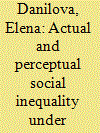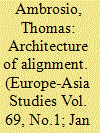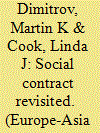| Srl | Item |
| 1 |
ID:
151456


|
|
|
|
|
| Summary/Abstract |
This essay aims at comparing social inequality in Russia and China and how it is perceived by the urban population. The study from which evidence is drawn was conducted through a common methodology of representative surveys of the adult population in two big cities—Shanghai and St Petersburg. The investigation shows that although people in Russia and China have broadly egalitarian attitudes, there are significant differences in the way in which Russians and Chinese regard the current system of distribution. Attitudes to social inequality are much more complicated than a direct link with the objective social situation would suggest. Egalitarian attitudes are connected not only with the actual incomes but they are very powerfully affected by subjective assessments of the distributive system. The essay argues that behind a tendency towards the convergence of political regimes in the two countries at the present time there are different patterns of legitimacy based not only on economic achievement but also on the attitudes of the population, which the ruling elites use in seeking to strengthen their monopoly.
|
|
|
|
|
|
|
|
|
|
|
|
|
|
|
|
| 2 |
ID:
151460


|
|
|
|
|
| Summary/Abstract |
The relative durability of the growing alignment between Russia and China is perhaps the central question regarding this relationship. This article examines the degree to which cooperation and policy coordination have become institutionalised between these two states through the creation of a complex and self-reinforcing network of bilateral and multilateral agreements. Grounded in the literature on treaty nestedness and utilising social network analysis, this article examines 154 bilateral Russia–China agreements and 54 agreements and declarations signed under the Shanghai Cooperation Organisation.
|
|
|
|
|
|
|
|
|
|
|
|
|
|
|
|
| 3 |
ID:
151458


|
|
|
|
|
| Summary/Abstract |
There has been an extensive debate about the relationship between economic development and democratisation. One view is that economic development is a pre-requisite for democracy. Another view is that the emergence of democracy is largely random, and economic prosperity is important only for ensuring democracy’s survival in the event of a crisis. This essay contributes to this debate by using public opinion surveys collected over an extended period to examine patterns of economic change and public support for democracy in China and Russia. The results show that education and, to a lesser extent, social mobility and economic attitudes, play an important role in promoting pro-democracy attitudes in both countries. The results have implications for democratisation, with an increasingly large tertiary-educated middle class acting as a potential driver for democratisation in China, and for the return of a free, fair and competitive democracy in Russia.
|
|
|
|
|
|
|
|
|
|
|
|
|
|
|
|
| 4 |
ID:
151454


|
|
|
|
|
| Summary/Abstract |
At the third BRICS summit on Hainan Island in 2011, Russian president Dmitri Medvedev claimed that the BRICS countries—with the addition of South Africa to Brazil, Russia, India and China—now included the ‘biggest states of three continents’.
|
|
|
|
|
|
|
|
|
|
|
|
|
|
|
|
| 5 |
ID:
151461


|
|
|
|
|
| Summary/Abstract |
The different agreements on oil and natural gas signed by Russian and Chinese companies testify to the profound changes in the oil and gas policies of both Russia and China. We stress the importance of the contractual norms which structure the energy interdependency of the countries involved. As there is no international multilateral framework able to manage energy supply security, the way the countries involved construct their energy interdependence to an extent defines models of sectoral governance.
|
|
|
|
|
|
|
|
|
|
|
|
|
|
|
|
| 6 |
ID:
151457


|
|
|
|
|
| Summary/Abstract |
This essay analyses the determinants of support for state social welfare provision in Russia and China on the basis of a four-stage recursive model using two waves of the World Values Survey. It hypothesises that support is a function of economic self-interest, tapped by subjective economic satisfaction and relative income; ideology including beliefs about market fairness and inequality aversion; as well as temporal context. It finds that subjective economic satisfaction reduces support; inequality aversion is a positive influence, while beliefs about market fairness matter in different ways. Support increased over the period spanning the 2008 global financial crisis.
|
|
|
|
|
|
|
|
|
|
|
|
|
|
|
|
| 7 |
ID:
151455


|
|
|
|
|
| Summary/Abstract |
The social contract thesis explained stability in communist autocracies as a consequence of an implicit exchange between the regime and the populace: citizens remained quiescent and the regime provided them with secure jobs, social services, subsidised housing, and consumer goods. Our essay asks how well the social contract thesis applies in three different types of regimes. We review classic literature on the socialist social contract in light of newly available archival evidence on the Soviet Union. We turn then to reform-era China and Putin’s Russia, finding that these post-socialist regimes create distinctive ‘market social contracts’. Our work shows that communist and authoritarian leaders cater to the consumption needs of populations in a strategic effort to remain in office and highlights the centrality of mass cooptation for explaining durable authoritarianism.
|
|
|
|
|
|
|
|
|
|
|
|
|
|
|
|
| 8 |
ID:
151459


|
|
|
|
|
| Summary/Abstract |
Recent research on authoritarian regimes argues that they provide public goods in order to prevent rebellion. This essay shows that the ‘threat of rebellion’ alone cannot explain Chinese party-state policies to extend public goods to rural residents in the first decade of the twenty-first century. Drawing on theories of policy making, it argues that China’s one-party regime extended public goods to the rural population under the influence of ideas and policy options generated by policy communities of officials, researchers, international organisations and other actors. The party-state centre adopted and implemented these ideas and policy options when they provided solutions to external shocks and supported economic development goals. Explanations of policies and their outcomes in authoritarian political systems need to include not only ‘dictators’ but also other actors, and the ideas they generate.
|
|
|
|
|
|
|
|
|
|
|
|
|
|
|
|